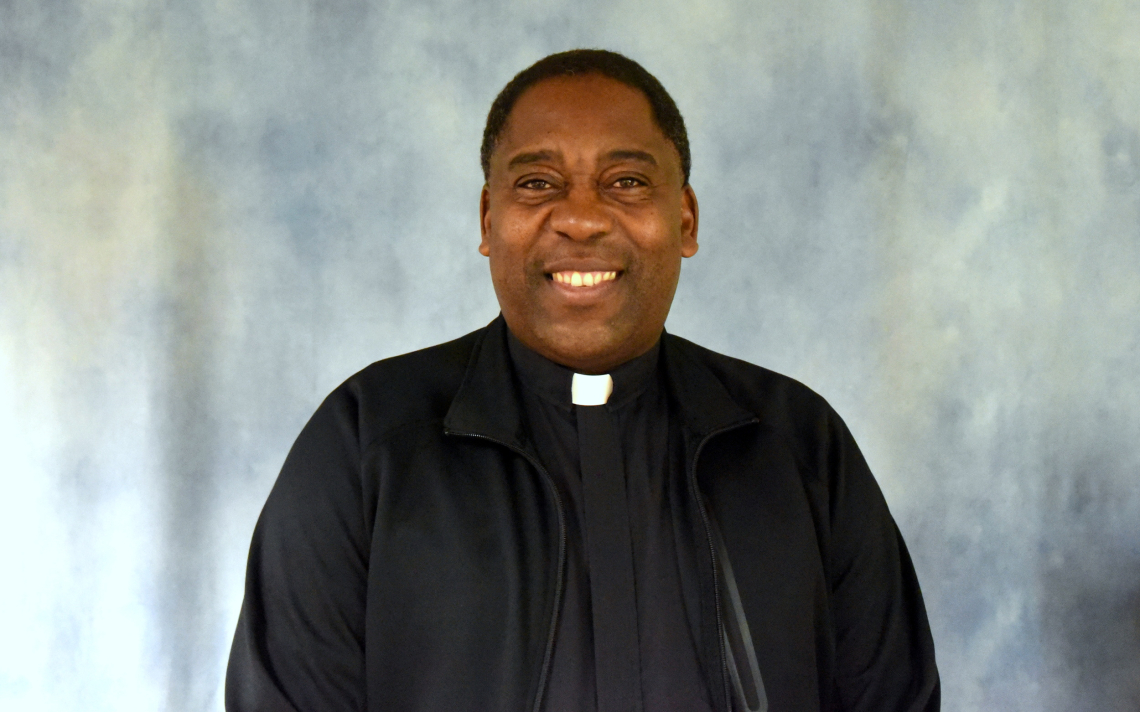Father Cyprian Tatah brings decades of experience to Maine

In his 30 years as a priest, Father Cyprian Tatah has had a wide range of experiences. He has preached in villages, studied in Rome, served as chancellor of the Diocese of Kumbo, been assigned to the U.S. Virgin Islands, and now, he is a parochial vicar of the Portland Peninsula & Island Parishes.
“I am very happy to be a parochial vicar,” he says. “I am very, very happy to be here to collaborate with you.”
Father Cyprian, who arrived in Maine in July, says he is looking forward to his time here and to experiencing more of the universality of the Church.
“Having the opportunity to come to America and to be able to share my faith is a wonderful experience. That is why I thank God for being a priest,” he says.
Father Cyprian is originally from Roberta-Kikaikom, a village within the town of Kumbo in Cameroon. Faith was part of his life from a young age. His father was a catechist who would lead services when a priest wasn’t available to celebrate Mass.
“When the priest was not coming, he knew before time, so then he would lead the services and preach to the people,” says Father Cyprian.
Father Cyprian says his father used to take him to doctrine classes, so he learned about the Catholic faith at a young age. He then attended a Catholic primary school before being admitted to the minor seminary in 1979, when he was just 11 years old.
Father Cyprian says his desire to go to minor seminary wasn’t actually based on a call to the priesthood, but rather, he wanted to attend because his older brother told him of the school’s reputation for treating its students well.
“He discussed the school and said it was a very good school. He said in that school, they eat margarine and they eat butter, so I was attracted to going to the school,” he says. “I used to love to eat bread and butter, so I said that if they give that type of food, then I will go there.”
First, however, he had to get past the admission interview. Again, he followed his brother’s advice.
“I knew I only had to answer one thing – that I wanted to be a priest," he says. "For the one-hour trek from my village, I repeated, ‘I want to be a priest. I want to be a priest.’”
Located in Buea, the school was 400 miles from his village, so he stayed there throughout the year, only returning for the summer. He says after his first year, he considered not going back but was struck by the welcome he received when he returned home.
“Everyone in the village came to greet me,” he says. “It was so good, and I thought to myself, ‘If I don’t go back, I will lose these greetings next year, so I went back.”
Father Cyprian says the idea of a vocation slowly matured in him, and he continued on to the major seminary. He says he chose diocesan priesthood because he wanted to serve close to home.
After his ordination in 1993, he served in a parish for one year before becoming the bishop’s secretary for the next five. He says it was a significant period for the Church in Africa because Pope John Paul II had just issued the apostolic exhortation Ecclesia in Africa, following a Special Assembly for Africa of the Synod of Bishops. The assembly’s purpose was to help the Church in Africa better embrace its evangelizing mission.
“Our first bishop from the Diocese of Kumbo chose me to be the chairperson for what he called The Synod Follow up Commission, which was supposed to take the post-synodal document, read it, and devise a plan of implantation,” he says.
The plan focused on Small Christian Communities.
“We want you to know each other, to pray with each other, to collaborate with each other, so much so that you are able to live the Gospel message of love here and now. That is what the plan is based on,” he says.
The idea was to then have those Small Christian Communities feed all levels of Church leadership because people from them would be chosen to collaborate with priests on the parish level. Then people from the parishes would be selected to guide deaneries, and from the deaneries, people would be chosen for diocesan positions.
“Our Church is then structured in such a way that you are able to run up and down,” he says. “What is important is that if you are going to be at the diocesan level, then you also have to be in a Small Christian Community.”
The plan also included the formation of commissions, for instance for liturgy, youth, and catechesis, in order to encourage people to more fully use their God-given talents.
“The whole mechanism behind it is to simply get people involved in order for them to assume their places as people of God, because we discovered that people were onlookers in church,” he says.
After serving the bishop, Father Cyprian returned to parish ministry, but then went to the Pontifical Urban University in Rome where he received a licentiate in biblical theology. His future assignments included both parish ministry and administrative positions. He was a member of the diocesan pastoral formation team, a seminary teacher, canon of the cathedral, and Catholic education secretary. He also served the Ecclesiastical Province of Bamenda in several capacities including as a member of the Provincial Commission for Catechesis and Pastoral Affairs, his final assignment before leaving for the Virgin Islands and now Maine.
“It is always a gift to know one additional person in your life, to talk to other people, to be in other places, so I am very grateful,” he says. “I look forward to seeing what the Lord has for me in this diocese."










